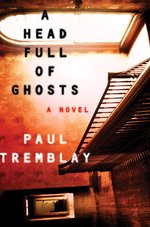 William Morrow / June 2015
William Morrow / June 2015
Review by: Vince A. Liaguno
Paul Tremblay’s masterful A Head Full of Ghosts is a postmodern homage to horror’s demonic possession subgenre that capitalizes on the reader’s familiarity with its well-worn imagery while employing a meta-modern sheen that toys with—and then skillfully subverts—expectations. It’s quite possibly the year’s best work of speculative fiction.
Fifteen years ago, the Barret family – parents John and Sarah, daughters Meredith and Marjorie – found themselves struggling with the sudden onset of eldest daughter Marjorie’s mental illness. When mental health professionals fail to provide either diagnosis or successful treatment for the fourteen-year-old’s increasingly bizarre behavior, John turns to his renewed Catholicism for answers. Enter Father Wanderly, a local priest, who is quick to suggest that the suffering teen is in the grips of a full-fledged demonic possession and recommends exorcism. When the family’s deteriorating personal finances converge with an opportunistic media, the Barret’s reluctantly find themselves – and their daughter’s impending exorcism – the subjects of a Discovery Channel reality television show, dubbed The Possession. The show garners banner ratings and sets into motion a steadily escalating series of terrifying events that end in real-life tragedy and become the stuff of pop culture legend.
Years later, bestselling non-fiction author Rachel Neville sets out to uncover the truth about what happened inside the Barret’s home on the set of The Possession and finds a willing interview subject with the now twenty-something younger daughter, Merry. As Merry recants the story of what happened to her family, the fine lines that exist between fact and fiction, memory and reality, simultaneously sharpen, blur, and sharpen again. Was teenage Marjorie possessed by a demon, suffering from acute schizophrenic, or faking the whole thing?
A Head Full of Ghosts reads like the literary equivalent of a found-footage horror film, complete with an utterly heartbreaking M. Night Shyamalan-like twist late in the novel’s third act. Tremblay wears the novel’s cinematic counterpart genre influences proudly, with The Exorcist being the most readily identifiable. Employing a framing device similar to Interview with the Vampire intercut with a horror blogger’s astute deconstruction of the reality TV series, Tremblay’s narrative structure is reminiscent of Marisha Pessl’s brilliantly layered Night Film.
At its heart, A Head Full of Ghosts is a work of horror; but in Tremblay’s capable hands it’s also a subtly scathing commentary on the reality-TV pop culture landscape, with a few well-placed swipes at this country’s gross mishandling of mental health problems, the disintegration of the nuclear family, and the Catholic Church and organized religion in general—even a thinly-disguised Westboro Baptist Church makes a cameo appearance.
Come awards time—think the Bram Stoker or Shirley Jackson Award—it will be quite disappointing (and bewildering, frankly) if A Head Full of Ghosts doesn’t rack up the nominations and wins. Tremblay has, quite simply, written a real contender for the year's best work of horror.
Purchase A Head Full of Ghosts by Paul Tremblay.